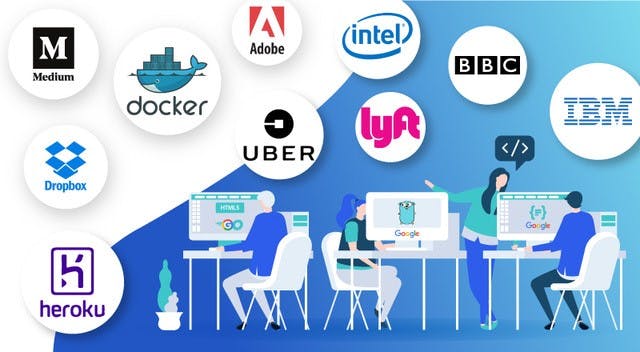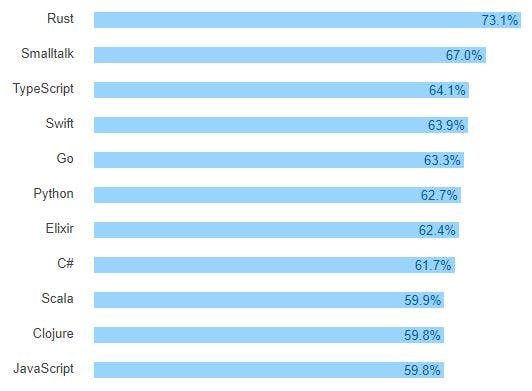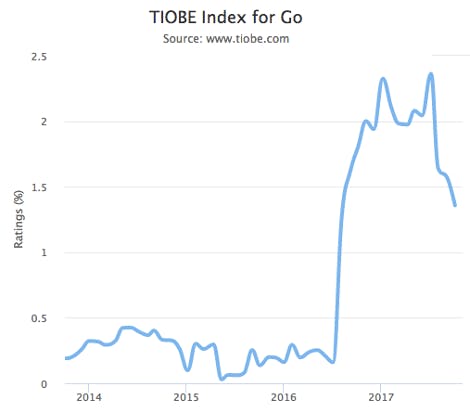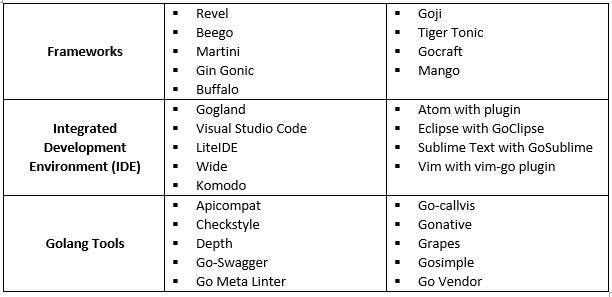"Go will be the server language of the future." — Tobias Lütke
Google has never ceased to amaze us all. Here it comes, with another feather in its cap that has been soaring high on the popularity charts. Google’s Go programming language has created quite a stir in the software development industry. It is being considered amongst the first choices, especially for web development. As compared to peers like Ruby on Rails, Python, Node.js, ASP etc., Go seems moving a step further. Considered a powerful, scalable and performant language, it is considered optimum for developing web apps, APIs, microservices and other distributed services. If you are looking for a fresh replacement to traditional programming languages, Go should be the right choice.
Google’s Go seems like it is C, but it is not. It is quite different than most other languages. It offers the right mix of benefits of traditional low-level languages and the modernity of today’s programming environment. Considered an easy-to-use model to the program, it is a developer’s delight.
Google's Go Programming Language- A Brief History
Initially developed at Google in 2007 by Robert Griesemer, Rob Pike and Ken Thompson, Go is also known as "golang".
It open sourced in 2009 and reached its version one in 2012.
It became popular by getting used initially in Google’s production systems and then it never had to look back in terms of popularity and acceptance.
The fundamental design aspect of Go was inspired by the different characteristics of various programming languages like Algol, Pascal, C, Modula, Oberon, Smalltalk and Newsqueak.
The basic purpose of Go was because Google engineers wanted to invent a novel language that has the positives of the traditional languages but disables their negatives too.
It is bifurcated into two main components: Google’s Go compiler gc – an open source software for Linux, Windows, OS X, Unix etc. and gccgo – especially for mobile devices and smartphones
The Go Programming Language Promo Video by Google Developers, have a look!
Key Features of Go Programming Language
Go executes straight on the original hardware. Just like C and C++, it has an added advantage of performance since it is compiled and not interpreted
It handles data from multiple sources in a competent manner and hence becomes easier for the developers to finish incoming requests easily, freeing up the network time
Google Go works great towards reducing the amount of data needed to display search results by 40%
Go possesses “goroutines” that consume almost 2KB memory from the heap and hence you can spin millions of goroutines at any instant.
- Goroutines have growable segmented stacks that can use increased memory only when required
- Goroutines have a swifter start-up time than threads
- They come with in-built primitives for better communication within themselves
- A single instance of goroutine can run on multiple threads
Go powerfully handles concurrency just like Java, C, C++ and at the same time, keeps the execution code straight and simple
Code developed in this language is simplistic and easily maintainable. Its syntax is neat and clean making it easy for novices to adapt to it quickly.
In order to make it simple and reachable, Go does not have complicated features like classes, inheritance, exceptions, constructors, annotations, generics.
The very fact that Go is backed by Google and as we all know, Google has one of the finest cloud infrastructures globally and is scaled heavily. That works as a huge advantage to Go developers who are using Go for other projects/industries apart from their home ground.
It offers great support for environment adopting patterns like dynamic languages.
The compilation time is very fast and Go programs turn out to be simple, comprehensive and secure.
There is inherent concurrency provision with lightweight processes, support for interfaces and type embedding.
Of course, there are certain features that aren’t a part of Go but there are better reasons to it, one of them being - letting it be a simple and brief language. Features are not a part of it are support for circular dependencies, type inheritance, operator overloading, assertions, generic programming, pointer arithmetic etc.
Who Uses Go?
There are many, listing down just a few to have a feel of how popular golang is:

Source: https://github.com/golang/go/wiki/GoUsers
Proven Statistics That Showcase Increasing Popularity of Go

Courtesy: https://insights.stackoverflow.com/survey/2017#most-loved-dreaded-and-wanted

Courtesy: https://www.tiobe.com/tiobe-index/go/
How to Decide Whether to Use Go or Not, as a Software Development Language
From the plethora of programming languages floating around, it becomes difficult to understand and decide which one to choose. Here are some pointers that can help you decide why Go would be the right choice for you.
- If you want your software to GO fast, compile fast, run fast – go for golang
- If you need to focus on more on machine time rather than human time, Go is the right choice
- In case your domain is the machine and it is a performance critical development, Go works as a great substitute to C / C++
- If you are handling a characteristic n-tier application, Google Go is apt
- If you are handling your project with bytes, Go is a good option to go for
- If your area of work is data science, Go is great to go with since it has varied areas of focus in data science
- Since Go helps build prototypes as well as handles production, it is the right option for data science solutions
- For mission-critical software solutions, Go works well since it has good performance results and not much of overheads in terms of extra software components
Informative Reads About Google’s Go
Important Frameworks, IDEs and Tools for Golang
Here are some of the significant frameworks, IDEs and tools for Golang for ready reference. You just need to bookmark them on your browser and start using them as soon as you use Go. These technologies are best suited with Golang as your build projects, web frameworks and applications with Go language.

Few Disadvantages of Google’s Go, That Need Attention
- To make it simple and easy to learn, Go has opted not to use many components that developers have been using since long. The language did get easy to accept but has its turn of missing features that developers encounter. The day these features are a part of Go, there is no looking back
- Automation is as good as is bad. Using automation characteristics in programming has its own share of downfalls. There could be wrong instances of activities happening at the wrong time like garbage collection, server code etc
- The individual binaries involved in Go are huge in size. So, although there is no virtual machine, the size of a binary is tough to handle
- Go has lesser libraries as compared to its peers. Hence, it will take its time to come up to library-related features that developers don’t miss using
Wrapping it Up
Go has its own strands of individuality with a rare mix of positives with respect to other programming languages. Still on a growing spurt, Google’s Go has a bright future to look at, mainly because of the wonderful backing that it has from the tech giant itself. Designed explicitly to cater to cutting-edge technological needs, this programming language has been a developer’s delight owing to its intelligent construction and mastery of concurrent operations. Not only is Google leveraging its potential, there are many more conglomerates enjoying the goodness of Go. Watch out for this open source, modern, revolutionary custom software development language!